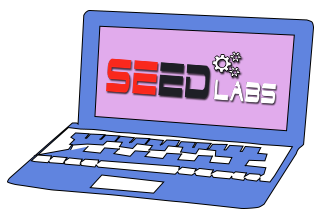

Students with Apple Silicon machines (M1/M2 chips) have not been able to run our pre-built SEEDUbuntu 20.04 VM, due to the lack of support from VirtualBox. They can now set up a SEED VM using VMWare Fusion Player (free version):
 If you prefer to create a SEED VM on your local computers, there are two ways
to do that:
(1) use a pre-built SEED VM;
(2) create a SEED VM from scratch.
If you prefer to create a SEED VM on your local computers, there are two ways
to do that:
(1) use a pre-built SEED VM;
(2) create a SEED VM from scratch.
Approach 1: Use a pre-built SEED VM. We provide a pre-built SEED Ubuntu 20.04 VirtualBox image (SEED-Ubuntu20.04.zip, size: 4.0 GB), which can be downloaded from the following links.
Approach 2: Build a SEED VM from scratch. The procedure to build the SEED VM used in Approach 1 is fully documented, and the code is open source. If you want to build your own SEED Ubuntu VM from scratch, you can use the following manual.
 Starting from SEED Labs 2.0, all the labs based on Ubuntu 20.04
can be conducted using one virtual machine on the cloud. The minimal
configuration is 1 CPU and 2 GB of memory.
Starting from SEED Labs 2.0, all the labs based on Ubuntu 20.04
can be conducted using one virtual machine on the cloud. The minimal
configuration is 1 CPU and 2 GB of memory.
Setup: Setting up the SEED VM on the cloud is not complicated. It involves two major steps: (1) create a VM instance on the cloud; (2) install software packages and conduct configuration on the VM. Please use the following manual:
Benefit: The cloud significantly increases the accessibility of the SEED labs. Students can work on the SEED Labs on any computer anywhere. There is no special hardware and software requirement on computers. Just for a proof of concept and also for fun, a smartphone, tablet, and Raspberry Pi are used to work on SEED labs in these pictures: phone, tablet, pi. These devices are simply VNC clients, and the actual work was done on the cloud.
Potential cost: There is a cost charged by the cloud companies, but normally it is not high. A typical lab requires less than 10 hours; on Google cloud, that costs about $0.25. Many clouds have special discounts for students, so the actual cost is lower (in many cases, it is pretty much free).
Feedback are appreciated: To help us understand how well the cloud approach works, we appreciate it if you can tell us about your experience using the following form:
The SEED Ubuntu 16.04 VM (SEEDUbuntu-16.04-32bit.zip) can be downloaded to your personal computer from the following links:
Labs based on this VM have already been phased out, but there are still two labs that are based on these VM, because the involved vulnerabilities have already been fixed in newer OSes. The VM (SEEDUbuntu12.04.zip) can be downloaded from the following links: